

Solar Panel Recycling: Photovoltaics Rebirth. The energy sector has gone through a drastic change, and the gradual transition to renewable energy sources is more than visible.
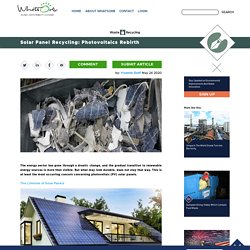
But what may look durable, does not stay that way. This is at least the most occurring concern concerning photovoltaic (PV) solar panels. The Lifetime of Solar Panels Solar panels glimmering in the sun are an icon of all that is green. But while generating electricity through photovoltaics is indeed better for the environment than burning fossil fuels, several incidents have linked the manufacture of these shining symbols of environmental virtue to a trail of chemical pollution. Recommended: Tiny House WikiHouse With Solar Panels On Roof And Walls They are a long-lasting source of energy, only dependent on solar radiation, and able to supply electricity to our homes.
Canadian company recycles minerals from electric vehicle batteries » Yale Climate Connections. As electric vehicles become more mainstream, the demand for lithium ion car batteries is growing.
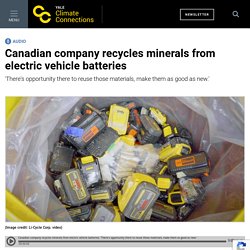
But to increase production, the industry needs more lithium, cobalt, and nickel. One possible source is batteries that are no longer in use. “It’s a bit of a waste to just have batteries sitting in a landfill. Company expands wind turbine recycling operation - Plastics Recycling Update. Wind turbines generate clean and renewable power, but when their blades reach end-of-life, the options – burning or landfilling – aren’t so green.
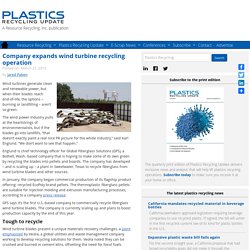
The wind power industry pulls at the heartstrings of environmentalists, but if the blades go into landfills, “that doesn’t exactly paint a real nice PR picture for the whole industry,” said Karl Englund. “We don’t want to see that happen.” Englund is chief technology officer for Global Fiberglass Solutions (GFS), a Bothell, Wash. -based company that is hoping to make some of its own green by recycling the blades into pellets and boards. The company has developed – and is scaling up – a plant in Sweetwater, Texas to recycle fiberglass from wind turbine blades and other sources.
In January, the company began commercial production of its flagship product offering: recycled EcoPoly brand pellets. GFS says it’s the first U.S. Plastic-eating wax worm 'extremely exciting' for global pollution crisis. Fungi Discovered In The Amazon Will Eat Your Plastic. The Amazon is home to more species than almost anywhere else on earth.
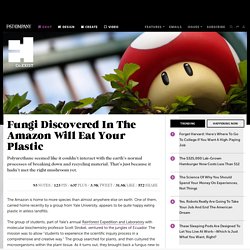
One of them, carried home recently by a group from Yale University, appears to be quite happy eating plastic in airless landfills. The group of students, part of Yale’s annual Rainforest Expedition and Laboratory with molecular biochemistry professor Scott Strobel, ventured to the jungles of Ecuador. The mission was to allow "students to experience the scientific inquiry process in a comprehensive and creative way. " The group searched for plants, and then cultured the microorganisms within the plant tissue.
As it turns out, they brought back a fungus new to science with a voracious appetite for a global waste problem: polyurethane. The common plastic is used for everything from garden hoses to shoes and truck seats. Student Pria Anand recorded the microbe’s remarkable behavior and Jonathan Russell isolated the enzymes that allow the organism to degrade plastic as its food source. 5 Ways to Green Your K-Cup. Since Keurig’s K-Cup coffee system arrived on the market in the late ‘90s, single-serve coffee makers have exploded in popularity.
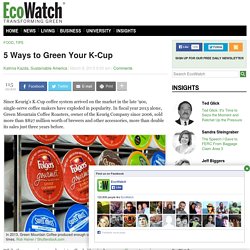
In fiscal year 2013 alone, Green Mountain Coffee Roasters, owner of the Keurig Company since 2006, sold more than $827 million worth of brewers and other accessories, more than double its sales just three years before. While the convenience and variety afforded by single-serve coffee systems is celebrated by many, the appliance’s darker side—the mountains of unrecyclable waste that result from its use—is equally abhorred by environmentalists and others concerned about the impacts of on-demand coffee.
To put this waste into perspective, John Sylvan, the system’s creator, has himself estimated that a single K-Cup machine can create ten times more waste than a conventional drip brewer, and in fact now notes regretting his invention. In 2013, roughly 10 billion individual K-Cup packs were sold. Here are five greener single-serve alternatives worth checking out: A lot of US plastic isn’t actually being recycled since China put up its Green Fence. For many environmentally conscious Americans, there’s a deep satisfaction to chucking anything and everything plasticky into the recycling bin—from shampoo bottles to butter tubs—the types of plastics in the plastic categories #3 through #7.
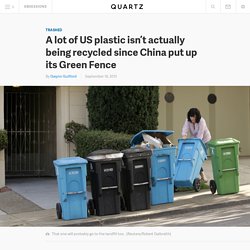
Little do they know that, even if their local trash collector says it recycles that waste, they might as well be chucking those plastics in the trash bin. “[Plastics] 3-7 are absolutely going to a landfill—[China’s] not taking that any more… because of Green Fence,” David Kaplan, CEO of Maine Plastics, a post-industrial recycler, tells Quartz. “This will continue until we can do it in the United States economically.”
The Green Fence went up…and it’s not coming down Kaplan is referring to an initiative the Chinese government launched last year ostensibly to reduce pollution. The program was supposed to end in November of 2013.